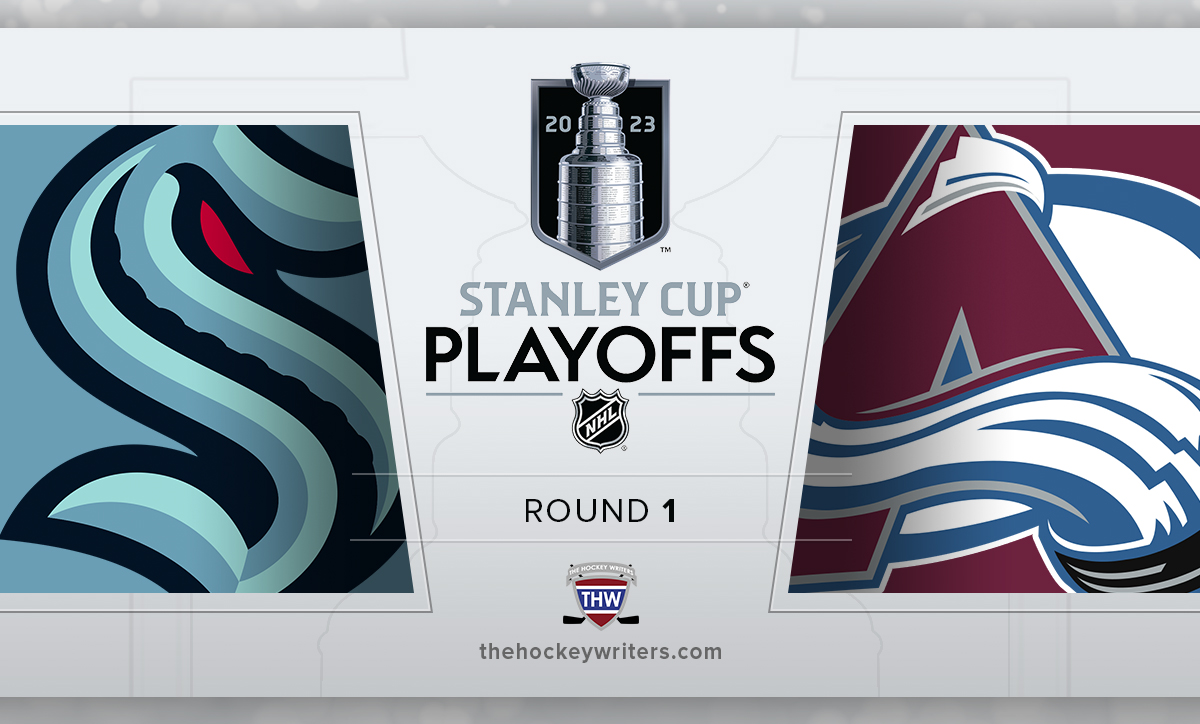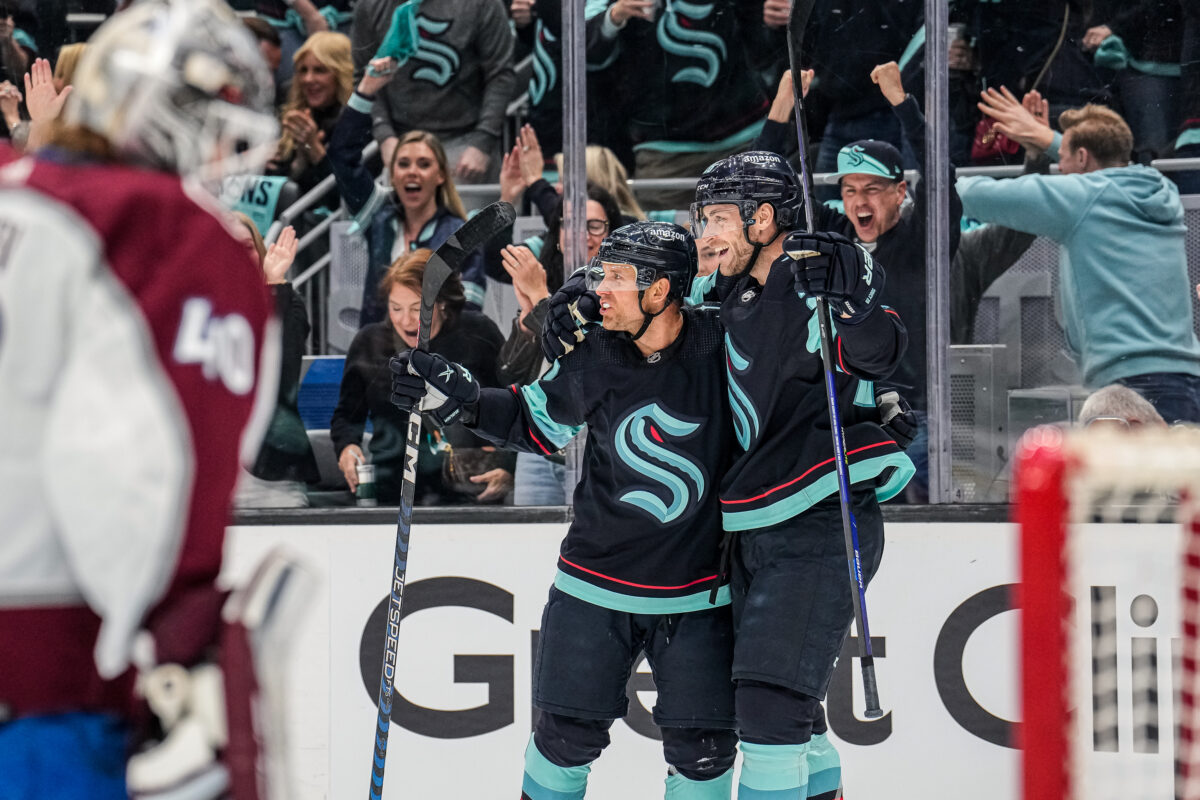With their season hanging in the balance, the Colorado Avalanche held off the Seattle Kraken in Game 6 of their first-round series and forced a Game 7 after a dominant 4-1 win at Climate Pledge Arena.
It’s not a position many thought the Avalanche would find themselves in after finishing first in the Central Division, but the Kraken deserve ample credit for pushing the defending Stanley Cup champions to the brink of elimination.

Now, the Avalanche are faced with a winner-take-all affair back home at Ball Arena against a Kraken club who finished with the sixth-best regular-season road record in the NHL and have already won twice in Colorado in this series.
With that context in mind, let’s dive into three ways that the Avalanche can emerge victorious in Game 7, and put an end to the Kraken’s inspired 2022-23 campaign.
Key #1: Avalanche Stars Need to Get the Power Play Going
For what has been a strength all year long, the Avalanche’s power play has gone cold at the worst time of the season. During the regular season, Colorado’s star offensive players managed to overcome average shot- and chance-generation with shooting talent, finishing with the sixth-best power play by both overall efficiency and goals per-60-minutes. Through six games against the Kraken, that has not been the case.
| Statistic (Per-60) | Regular Season | Playoffs |
|---|---|---|
| Goals | 8.8 | 2 |
| Scoring Chances | 59.4 | 68.3 |
| High-Danger Chances | 23.2 | 19.5 |
| Expected Goals | 8 | 8.1 |
| Efficiency (%) | 24.5 | 5.9 |
At a miserable 5.9 percent conversion rate, the Avalanche power play ranks 15th out of 16 playoff teams, ahead of only the already-eliminated New York Islanders (5.6 percent). For a team led by the likes of Nathan MacKinnon, Mikko Rantanen, and Cale Makar, that’s not acceptable, even going against one of the best regular-season penalty-killing teams in the Kraken by shot and chance suppression.
The percentages are running low at the moment, but given that the Avalanche have historically outperformed their expected metrics, their luck should turn before long.
It doesn’t help that Kraken goaltender Philipp Grubauer is running with a .919 save percentage (SV%) in the series after ranking 81st out of 96 goaltenders to have played in at least 10 games over the past two regular seasons with an .891 SV%.
If the Kraken can keep the Avalanche’s stars in check during Game 7, an upset predicted by almost no one in the hockey industry could be in the cards for the second-year franchise.
Key #2: Avalanche Must Be Prepared to Start on Time
For whatever reason, the Avalanche have had serious lapses in concentration during the first period. The Kraken have scored first in every game of the series, including having scored within the first 10 minutes in Games 1 through 4.
Over the first six games of the series, the Avalanche have been outscored 7-4 in the first period, but have tallied 14 goals to the Kraken’s nine in the second period and beyond.
You may also like:
- Colorado Avalanche Won’t Be Contenders This Season
- Colorado Avalanche Lineup Projection for 2024-25
- Avalanche Giving Nikolai Kovalenko a Chance to Prove Himself
- 3 Avalanche Players With the Most to Prove in 2024-25
- Peter “Foppa” Forsberg: A Biography
In fact, the Kraken have twice jumped out to 2-0 leads in the first 14 minutes of the first period, meaning the Avalanche have had to dig themselves out of significant holes on multiple occasions.
The lack of urgency to start each game has played out similarly in the shot chart. At 5-on-5, the Avalanche have been outshot 39-62 in the first period (38.6 percent of all shots) but have overrun the Kraken in the second and third periods, tallying 110 shots to Seattle’s 84 (56.7 percent).
The phenomena of score effects is on full display as the Kraken are more incentivized to sit back and defend with a lead while the Avalanche are forced to be more aggressive in order to claw back.
Of the eight first-round series, the Avalanche-Kraken series has spent the third-most time in a tie-game state at 5-on-5, and it’s there where the Kraken have posted a greater than 60 percent share of shots and scoring chances. Although it may seem counterintuitive, the Kraken may hope that Game 7 remains tied for as long as possible given their inability to fend off the Avalanche attack.

On one hand, the fact that the Avalanche have completed three successful comebacks can be seen as a testament to their resilience, but it’s also not a great habit to form when the stakes are so high on a game-by-game basis.
Of course, any team carrying the offensive firepower of the Avalanche can afford to spot their opponents a lead on occasion, but at some point their luck will run out. If current trends hold, an early Avalanche lead could spell doom for a Kraken team that would be forced to play a more wide-open style in the hopes of equalizing.
Can the Avalanche pull one more rabbit out of their hat or will the Kraken keep the defending champions at bay in the biggest game in franchise history to date? The answer will determine who faces the Dallas Stars in Round 2.
Key #3: Stay Disciplined Against the Kraken
Although the Kraken have fared just as poorly with the man advantage as the Avalanche (14th in the playoffs at 14.3 percent), Colorado must be wary of handing them too many opportunities, especially in a winner-takes-all situation.
The Kraken’s continued powerplay troubles come as little surprise, as they struggled to convert with much consistency during the regular season, ranking 21st in the league with a 19.8 percent efficiency. The lack of finishing talent on the roster outside of 40-goal man Jared McCann has contributed to the sterility, and it doesn’t help that McCann has essentially missed Games 4 through 6 with injury, and remains questionable for Game 7 at the time of this writing.
Not only have the Avalanche taken 25 penalties to the Kraken’s 21, but they’ve been shorthanded 21 times compared to Seattle’s 17 such opportunities. Those numbers put them near the middle of the pack for these playoffs, but it’s the fact that the Kraken have found themselves up a man more often that is of more concern.
Colorado’s penalty kill has done its job by erasing 85.7 percent of the Kraken’s opportunities (third in the playoffs) and lead the first round in shots, expected goals, and scoring chances allowed per-60-minutes. It’s a far cry from the regular season where they only ranked a middling 17th (79 percent) while sitting in the NHL’s bottom third for shorthanded goals, but it’s been enough.
Still, all it takes is one timely goal to swing the momentum in a Game 7, and the Avalanche’s regular-season efforts on the penalty kill suggest that checking that self-confidence at the door might be a prudent move.
Avalanche Betting on Stanley Cup Experience
Given that the Avalanche won the Stanley Cup just last season and had almost the entire roster return in 2022-23, the team is full of players with experience of playing under pressure. For as much of a cliché as it can be to state, their key players know what it takes to win and have grappled with some of the league’s biggest stars on the way to victory.
It’s only fair to note that the Kraken have a number of players who have experienced extended playoff runs during their NHL careers. Vince Dunn, Jaden Schwartz, Yanni Gourde, Jordan Eberle, Andre Burakovsky, Brandon Tanev, Justin Schultz, Jamie Oleksiak, and Martin Jones have all reached at least the conference final, and shouldn’t be overcome by the gravity of a Game 7.
The Avalanche know what’s at stake, especially as the Western Conference is entirely up for grabs with no clear favourite, unlike last season. Now, they must execute – which is easier said than done.
Data courtesy of Natural Stat Trick and the NHL